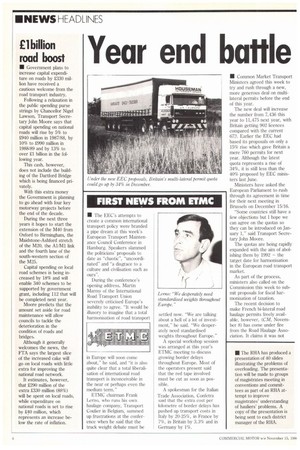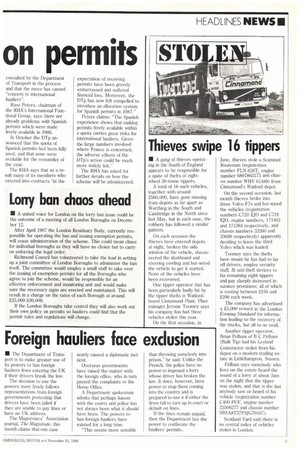Year end battle on permits
Page 6

Page 7

If you've noticed an error in this article please click here to report it so we can fix it.
• Common Market Transport Ministers agreed this week to try and rush through a new, more generous deal on multilateral permits before the end of this year.
The new deal will increase the number from 7,436 this year to 11,475 next year, with Britain getting 902 licences compared with the current 673. Earlier the EEC had based its proposals on only a 15% rise which gave Britain a mere 760 permits for next year. Although the latest quota represents a rise of 34%, it is still less than the 40% proposed by EEC ministers last June.
Ministers have asked the European Parliament to rush through its agreement in time for their next meeting in Brussels on December 15/16.
"Some countries still have a few objections but I hope we can agree on the quotas so they can be introduced on January 1," said Transport Secretary John Moore.
The quotas are being rapidly expanded with the aim of abolishing them by 1992 — the target date for harmonisation in the European road transport market.
As part of the process, ministers also called on the Commission this week to submit proposals for fiscal harmonisation of taxation.
The recent decision to make French bi-lateral road haulage permits freely available, however, (CM, November 8) has come under fire from the Road Haulage Association. It claims it was not
consulted by the Department of Transport in the process and that the move has caused "concern to international hauliers".
Russ Peters, chairman of the RHA's International Functional Group, says there are already problems with Spanish permits which were made freely available in 1986.
In October the DTp announced that the quota of Spanish permits had been fully used, and that none were available for the remainder of the year.
The RHA says that as a result many of its members who entered into contracts "in the expectation of receiving permits have been gravely embarrassed and suffered financial loss. Moreover, the DTp has now felt compelled to introduce an allocation system for Spanish permits in 1987."
Peters claims: "The Spanish experience shows that making permits freely available within a quota carries great risks for international hauliers. Given the large numbers involved where France is concerned, the adverse effects of the DTp's action could be much more widely felt."
The RHA has asked for further details on how the scheme will be administered.






























































































